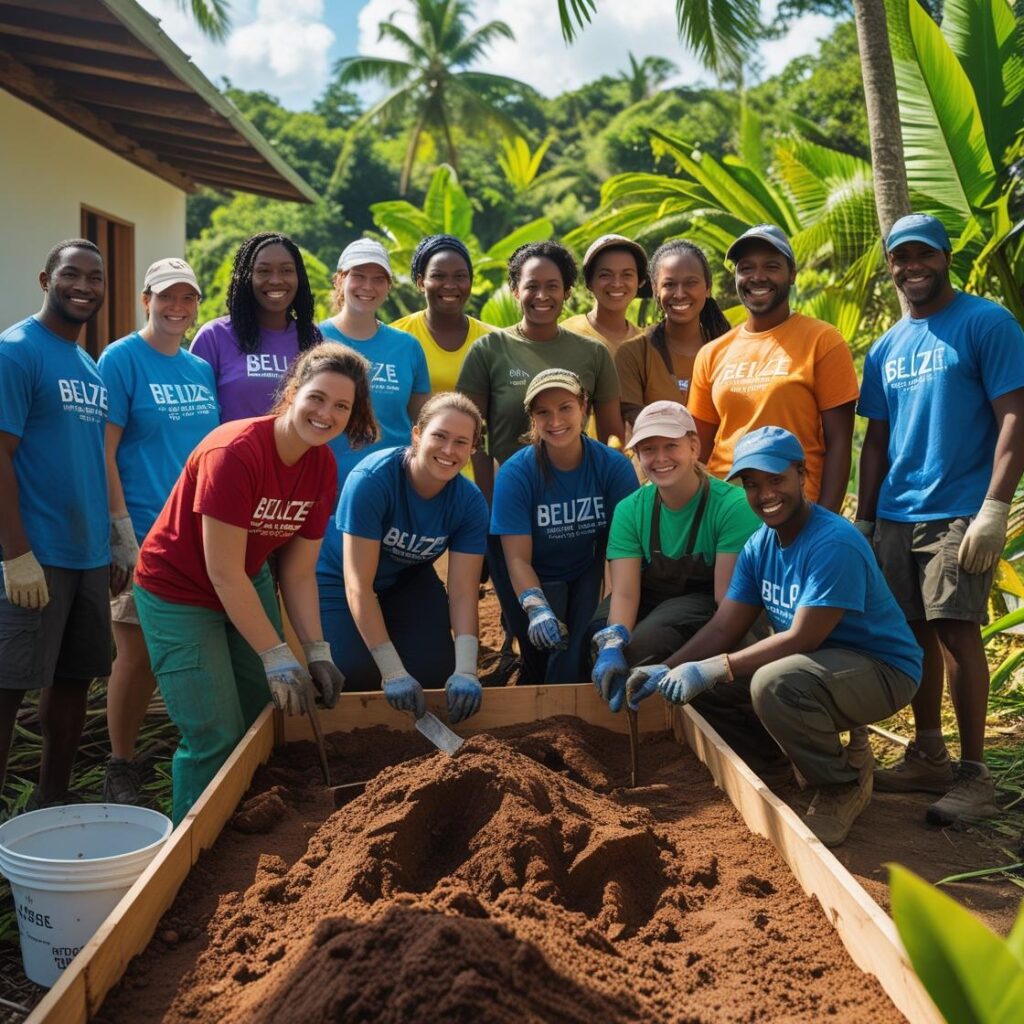بليز، بغاباتها المطيرة الوارفة وثقافاتها النابضة بالحياة وسواحلها الخلابة، تُتيح للمتطوعين فرصةً لا مثيل لها لإحداث تأثيرٍ هادف. سواءً كنت شغوفًا بحفظ الحياة البرية، أو التثقيف المجتمعي، أو حماية البيئة البحرية، فإن بليز لديها برنامجٌ مُصممٌ خصيصًا لك. سيُرشدك هذا الدليل إلى كل ما تحتاج لمعرفته، من اختيار المشروع المناسب إلى الاستعداد للحياة في أمريكا الوسطى.
اقرأ أيضاً: التطوع في البحرين | كيف تصبح متطوعًا؟
1. لماذا التطوع في بليز؟
تتميز بليز كوجهة تطوعية بفضل تنوعها البيولوجي ومجتمعاتها المترابطة. فهي موطن لثاني أكبر حاجز مرجاني في العالم، ومحميات غنية بالحياة البرية، ومواقع أثرية للمايا. يمكن للمتطوعين المساهمة في جهود الحفاظ على البيئة، ودعم المدارس المحلية، أو المساعدة في مبادرات الرعاية الصحية. بالإضافة إلى التطوير المهني وتحسين السيرة الذاتية، ستُنشئ روابط ثقافية عميقة، وتُساعد في مواجهة التحديات البيئية والاجتماعية المُلحة.
اقرأ أيضاً: التطوع في كندا | كيف تصبح متطوعًا؟
2. فوائد التطوع في الخارج
يُعزز التطوع في الخارج النمو الشخصي، والتفاهم بين الثقافات، ومهارات القيادة. كما أن الانغماس في المجتمع البليزي يُعزز المرونة والقدرة على التكيف، ويُحسّن إتقان اللغة، وهو أمرٌ مُفيدٌ للغاية إذا كنت ترغب في العمل دوليًا. وقد أفاد العديد من المشاركين بتحسن ثقتهم بأنفسهم وتجدد شعورهم بالهدف. علاوةً على ذلك، ستعود إلى الوطن بصداقاتٍ تدوم مدى الحياة وشبكات علاقات عالمية تُوسّع آفاقك المهنية أو تُلهمك لمزيدٍ من العمل الإنساني.
اقرأ أيضاً: التطوع في النمسا | كيف تصبح متطوعًا؟
3. أنواع برامج التطوع في بليز
تقدم بليز طرقًا متنوعة للتطوع:
اقرأ أيضاً: التطوع في بلجيكا | كيف تصبح متطوعًا؟
- الحفاظ على الحياة البرية وإعادة تأهيلها: العمل في مجال أبحاث اليغور، ومراقبة السلاحف البحرية، أو استعادة الغابات المطيرة.
- البحث والحماية البحرية: مساعدة علماء الأحياء البحرية في إجراء مسوحات للشعاب المرجانية والتثقيف بشأن الصيد المستدام.
- التنمية المجتمعية: المساعدة في بناء المدارس، أو تدريس اللغة الإنجليزية، أو إدارة برامج الشباب في القرى الريفية.
- دعم الرعاية الصحية والتمريض: دعم العيادات المحلية بالرعاية الأساسية والتثقيف الصحي وحملات التطعيم.
- علم الآثار والتراث الماياني: المشاركة في أعمال التنقيب والحفاظ على المواقع القديمة.
4. الأهلية والمتطلبات
تتطلب معظم برامج التطوع في بليز ما يلي:
اقرأ أيضاً: التطوع في البرازيل | كيف تصبح متطوعًا؟
- الحد الأدنى للعمر: عادة 18 عامًا؛ ويقبل البعض 16 عامًا بموافقة الوالدين.
- الموافقة الصحية: التطعيمات الحديثة (على سبيل المثال، التهاب الكبد A / B، والتيفوئيد، والتيتانوس) والفحص الطبي العام.
- التحقق من الخلفية الجنائية: خاصة لأولئك الذين يعملون مع الأطفال أو الفئات الضعيفة.
- المهارات اللغوية: اللغة الإنجليزية الأساسية كافية، على الرغم من أن معرفة اللغة الإسبانية أو الكريولية البليزية تعتبر ميزة.
- المتطلبات الخاصة بالبرنامج: بالنسبة للتدريب الطبي، قد تكون هناك حاجة إلى درجة أو شهادة ذات صلة.
5. عملية التقديم خطوة بخطوة
- منظمات البحث: قارن بين المنظمات غير الحكومية ذات السمعة الطيبة، مثل Belize Volunteer Corps، أو GVI، أو المنظمات الخيرية الأصغر حجمًا التي تتخذ من بليز مقرًا لها.
- اختر مشروعًا: قم بتوافق مهاراتك واهتماماتك مع احتياجات البرنامج.
- إرسال الطلب: يجب أن يتضمن السيرة الذاتية والبيان الشخصي والمراجع.
- المقابلة: تقوم بعض البرامج بإجراء مقابلات هاتفية أو عبر الفيديو لتقييم مدى ملاءمتك.
- تأكيد التعيين: قم بمراجعة اتفاقية المتطوع وتوقيعها، والتي تحدد الواجبات والرسوم وسياسات الإلغاء.
- إعداد الوثائق: الحصول على مستندات التأشيرة (تأشيرة سياحية صالحة لمدة 30 يومًا، قابلة للتمديد)، والتأمين على السفر، وشهادات الصحة.
- حضور التوجيه قبل المغادرة: التعرف على العادات والتقاليد في بليز، وبروتوكولات السلامة، وقوائم التعبئة.
6. التكاليف وخيارات التمويل
تتفاوت رسوم البرنامج بشكل كبير، وتتراوح عادةً بين 800 و2500 دولار أمريكي لمدة أسبوعين، وتشمل الإقامة والدعم داخل البلاد ونفقات المشروع. تشمل التكاليف الإضافية تذاكر الطيران الدولية (حوالي 500-900 دولار أمريكي من أمريكا الشمالية)، والوجبات غير المشمولة في رسوم البرنامج، والمواصلات المحلية. استراتيجيات التمويل:
اقرأ أيضاً: التطوع في كولومبيا | كيف تصبح متطوعًا؟
- حملات جمع التبرعات: منصات التمويل الجماعي، أو مبيعات المخبوزات، أو رسائل الرعاية.
- المنح الدراسية والمساعدات: ابحث عن جوائز منظمة الروتاري الدولية أو الجوائز الخاصة بالمنظمات غير الحكومية.
- التبرعات القابلة للخصم الضريبي: إذا كنت تتطوع مع منظمة 501(c)(3)، فقد تكون أجزاء من رسومك قابلة للخصم الضريبي.
7. أماكن الإقامة وترتيبات المعيشة
تشمل خيارات السكن التطوعي النزل ذات الطراز السكني، أو العائلات المضيفة، أو المعسكرات البيئية:
اقرأ أيضاً: التطوع في فنلندا | كيف تصبح متطوعًا؟
- بيوت الضيافة المحلية: انغمس في حياة القرية، وشارك في وجبات الطعام مع العائلات، ومارس اللغة الكريولية.
- مساكن المتطوعين: أسرة بطابقين أساسية، ومطابخ مشتركة، وأنشطة جماعية.
- المخيمات البيئية: كبائن ريفية في الغابات أو الشواطئ، مثالية لمتطوعي الحفاظ على البيئة.
توقعوا وسائل راحة متواضعة: كهرباء متقطعة، ودُشّ بارد، وناموسيات. استمتعوا بالبساطة، فهي تُعزز الترابط المجتمعي وتُعمّق المشاركة الثقافية.
اقرأ أيضاً: التطوع في فرنسا | كيف تصبح متطوعًا؟
8. الاعتبارات الثقافية واللغة
يتألف سكان بليز من خليطٍ من مجتمعات المايا والمستيزو والغاريفونا والكريول والمينونايت. احترم التقاليد المحلية بارتداء ملابس محتشمة في القرى واستأذن قبل تصوير الأفراد. اللغة الإنجليزية هي اللغة الرسمية، ولكن الكريول (الكريول) والإسبانية شائعتان. تعلم عبارات شائعة – مثل “مي ديه ياه” (أنا هنا) و”تانك يوه” (شكرًا لك) – يُساعد على كسر حاجز الصمت ويُظهر احترامًا للثقافة المحلية.
اقرأ أيضاً: التطوع في اليونان | كيف تصبح متطوعًا؟
9. احتياطات السلامة والصحة
تعتبر بليز آمنة بشكل عام للمتطوعين، ولكن اتخذ الاحتياطات التالية:
اقرأ أيضاً: التطوع في إندونيسيا | كيف تصبح متطوعًا؟
- التطعيمات: الحمى الصفراء (في حالة الوصول من بلد موبوء)، واللقاحات الروتينية، والوقاية من الملاريا في حالة العمل في مناطق الغابات.
- الماء والطعام: اشرب المياه المعبأة في زجاجات، وتجنب الأطعمة التي تباع في الشوارع حتى تتكيف معدتك.
- الحياة البرية والبيئة: اتبع تعليمات المرشدين أثناء الرحلات؛ واحترس من الثعابين والبقاء داخل المناطق المحمية.
- الأمن الشخصي: تجنب المشي بمفردك في الليل في المراكز الحضرية؛ احتفظ بالأشياء الثمينة في خزائن أو خزائن آمنة.
قم بالتسجيل في برنامج تسجيل المسافرين التابع لسفارتك واحتفظ بجهات الاتصال في حالات الطوارئ في متناول يدك.
اقرأ أيضاً: التطوع في ماليزيا | كيف تصبح متطوعًا؟
10. نصائح لتجربة تطوعية ناجحة
- كن مرنًا وصبورًا: قد تكون البنية التحتية بطيئة؛ وقد تتغير الجداول الزمنية وفقًا للطقس أو الأحداث المجتمعية.
- التواصل مع السكان المحليين: التطوع إلى جانب أعضاء المجتمع؛ وحضور المهرجانات الثقافية.
- وثّق رحلتك: احتفظ بمذكرات أو مدونة لتعكس تأثيرك ونموك الشخصي.
- مارس عادات مستدامة: قلل من استخدام البلاستيك، ودعم الشركات المحلية، واتبع البروتوكولات الصديقة للبيئة.
- البقاء على اتصال: شارك التعليقات مع مؤسستك للمساعدة في تحسين البرنامج للمتطوعين في المستقبل.
يُقدّم التطوع في بليز رحلةً تحويليةً تُسهم فيها جهودكم مباشرةً في دعم المجتمعات والنظم البيئية المحتاجة. باختياركم البرنامج المناسب بعناية، والتحضير الجيد، وتقبّلكم للثقافة المحلية، لن تكتسبوا مهاراتٍ قيّمة فحسب، بل ستُحدثون أيضًا تغييرًا إيجابيًا مستدامًا. ابدأوا التخطيط اليوم، واتخذوا الخطوة الأولى نحو مغامرة تطوعية لا تُنسى في بليز!
اقرأ أيضاً: التطوع في أستراليا | كيف تصبح متطوعًا؟
الخلاصة:
يُعدّ التطوع في بليز وسيلةً مُجزيةً للمساهمة في الحفاظ على البيئة وتنمية المجتمع، مع تنمية مهاراتك الشخصية والمهنية. من خلال البحث الجيد والتحضير الجيد والاحترام الثقافي، يُمكنك تعظيم أثرك والاستمتاع بمغامرةٍ قيّمة. انطلق – بليز تنتظر مواهبك الفريدة وتفانيك.
اقرأ أيضاً: التطوع في بلغاريا | كيف تصبح متطوعًا؟



